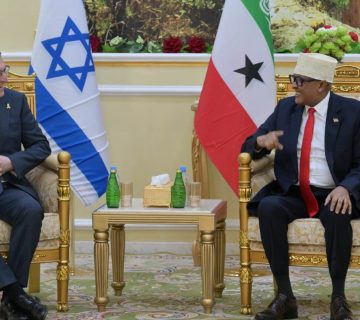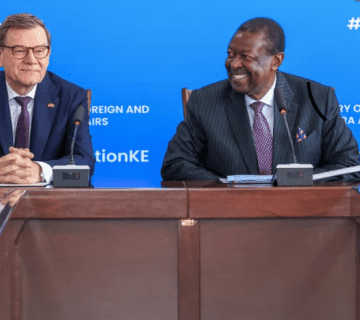The choice for the next African Union Commission Chairperson among the current candidates cannot be clearer. Of the three candidates who include Madagascar’s Richard Randriamato and Djibouti’s Mahmoud Youssouf, Kenya’s Raila Odinga, a reformist and Pan-Africanist par excellence, has by far the strongest credentials to uniquely qualify him to steer the much-needed reforms and drive the continental vision and agenda. He is not only the strongest candidate Kenya has ever fronted to lead regional or international bodies, he is also the most experienced, networked and charismatic figure to vie for the African Union Commission Chairmanship.
Raila Odinga has a rich history of high-level political leadership, spanning over four decades, which includes key roles as Member of Parliament (1992 – 2013), various Ministerial positions (2001 – 2005) and Prime Minister of Kenya (2008 – 2013). In fact, he served as Prime Minister during Kenya’s most turbulent moment; he was instrumental in championing transitional justice and stabilizing the country from post-election violence of 2007/08 and demonstrated astute capability to manage complex political landscapes while promoting democratic governance, accountability and human rights. His political history is punctuated by patriotic and sacrificial commitment to democratic governance, political reforms, justice and freedom. In so doing, Raila midwifed one of Africa’s most progressive constitutions and a devolved system of governance in Kenya in 2010. Not only has Raila’s political career empowered the Kenyan public and decentralized power and resources in Kenya, it has also ushered in a new era of growth and equitable development which has moved Kenya from one of the smallest economies in Sub-Saharan Africa to the ninth largest economy in Africa.
Raila thus demonstrates the ability to steer the African Union towards stabilizing Africa, support people-centred and democratic leadership across the continent, and champion the realization of Agenda 2063 which is now at a grave risk of failing in its entirety and casting African leadership in bad light. This is in view of the current zeitgeist of political uprisings and popular clamour for reforms and economic development, coupled by the failure of Millenium Development Goals (MDGs) and the excruciatingly slow progress in implementing Sustainable Development Goals (SDGs) in Africa.
Most importantly, Raila’s extensive political career, has been characterized by stellar diplomatic performance through which he has remained one of the most ardent champions of Pan-Africanism in modern-day Africa and earned him a wide network of support among African leaders. His speech at the Woodrow Wilson International Centre in 2013 evidences his Pan-Africanist focus and ability to project the African agency at the global stage. He has stood on the same pedestal as other Pan-Africanist peers including former Presidents Thabo Mbeki (South Africa) and Olusegun Obasanjo (Nigeria) as well as the former Prime Minister of Ethiopia, Meles Zenawi given his charismatic influence and articulation of Africa’s aspirations. As a key figure in East African politics, he has proven his dedication to regional integration and cooperation within the East African Community (EAC) and later at the continental level in his role as the African Union Special Envoy for Infrastructure (2018 – 2023). In the latter role, he championed key connectivity infrastructure and robustly supported the Africa Continental Free Trade Area (AfCFTA).
Odinga’s advocacy for regional integration and economic cooperation resonates with the AUC’s mission to foster unity among African nations. His established relationships with leaders across the continent and beyond will facilitate dialogue and collaboration on pressing issues such as health, security, and climate change. His focus on collaboration can lead to more fruitful partnerships and solutions in tackling pressing challenges like poverty, climate change, and security issues that affect the continent. Furthermore, Raila’s emphasis on governance, democracy, and human rights aligns perfectly with the African Union’s mission. His ability to engage in constructive dialogue makes him an ideal mediator in conflicts and agent for African Union’s “Silencing the Gun Initiative”, which envisions peace and stability as a key driver of economic development. In a time when Africa faces numerous socio-economic and political hurdles, his visionary leadership could steer the organization towards innovative solutions.
In conclusion, the combination of Raila Odinga’s political acumen, dedication to African Unity, and established diplomatic prowess make him an outstanding candidate for the African Union Commission post. His opponents lack high-level political and governance experience, having only been traditional civil servants with no known continental roles and impact. Madagascar’s Randriamato has only had a short stint of three years as Foreign Affairs Minister. Raila’s leadership could significantly advance the African Union Commission’s objectives, reinforcing unity and promoting peace and prosperity across Africa. With his experience, commitment to unity, and focus on human rights, Raila Odinga is indeed an excellent choice for the African Union Commission Chairman position. His leadership could pave the way for a stronger, more resilient Africa.
Photo Credits: TV47 Kenya



